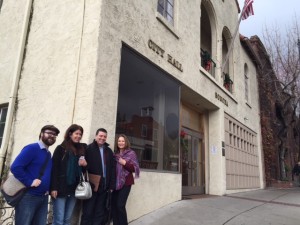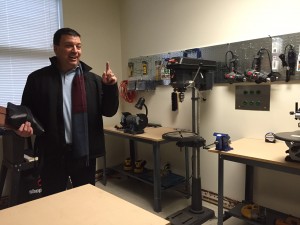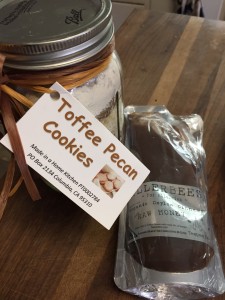 On December 17, the CAMEO staff took a field trip to visit Larry Cope, the head of economic development in Tuolomne County, at his office in Sonora. After chatting with him for a few minutes, it was clear to all of us that the work Larry and his team do represents the epitome of a DIY Economy.
On December 17, the CAMEO staff took a field trip to visit Larry Cope, the head of economic development in Tuolomne County, at his office in Sonora. After chatting with him for a few minutes, it was clear to all of us that the work Larry and his team do represents the epitome of a DIY Economy.
Shortly after Larry started his job in March of 2009, Sonora (the county seat) lost 4,500 jobs from the closure of Mervyn’s, Gottshalk’s, and Sierra Pacific. He had his work cut out for him. So he set his team to work.
Not wanting to lose more companies, they focused on business retention for the first three years – and entrepreneurship. They weren’t planning on beefing up the latter, but he found out that all of the entities that provided business assistance were duplicating services. And in a rural area with a small economic development budget, that needed to change. He sat everyone down at the table – Columbia College, SCORE, the SBDC and other stakeholders – and created the Business Alliance of Tuolome County. They streamlined their offerings and each entity concentrated on what they did best. They organize 25 basic classes a year in workshop format in everything from business plan basics to marketing to social media; and they started an enhanced counseling program with CDBG funds for businesses in the city of Sonora.
In 2012, Larry organized the Central Sierra Economic Development District that includes Alpine, Calaveras, Tuolome, and Mariposa counties as well as a handful of cities. They share resources and provide classes. This year their main goals will be to expand broadband connectivity outside the towns and expand support to microbusinesses.
 In another effort, Larry and his team marshaled resources and leveraged relationships to open the InnovationLab in September 2014. They partnered with UC Merced and others, raised just $35,000, negotiated very cheap rent with the county, and cut the ribbon on a collective space that includes a networking/co-working space, a computer lab, an electronics lab, a hard tool workspace, a 3-D printing lab and more. They should break even in six months and after two months are well on their way.
In another effort, Larry and his team marshaled resources and leveraged relationships to open the InnovationLab in September 2014. They partnered with UC Merced and others, raised just $35,000, negotiated very cheap rent with the county, and cut the ribbon on a collective space that includes a networking/co-working space, a computer lab, an electronics lab, a hard tool workspace, a 3-D printing lab and more. They should break even in six months and after two months are well on their way.
Before Larry started, the county’s economic development strategy was based on chasing smoke stacks, or business attraction. The idea of business attraction needs to be reformed, and alternative incentives need to be developed. Cash and tax give-aways aren’t the only thing. Larry and his team are using free rent in vacant government properties and connecting potential businesses with local investors. They’re beefing up the STEM curriculum in the high school and community college. Attraction at any cost has to go” says Larry. “We need to think of the types of businesses that would provide sustainable, long term economic growth for the community.”
The type of businesses Larry and his team try to attract to Sonora are small technology companies and family-based businesses that are squeezed out of the Bay Area. Family-based businesses aren’t worried about shareholder value; they have a stake in their community and have an expanded sense of what it means to be successful. If a business is all about the bottom line, then at some point or another, that business is bound to leave.
 It’s not all about hi-tech. Larry helped Mountain People Organics, an organics buying club, find space in the old National Guard building for 20 cents a square foot. Two days a week, the space holds MPO’s buying club, as well as a farmer’s market with organic food producers and craftspeople – collectively called The Farmory. Larry and his team connect the microbusiness owners with the resources the county and city have to offer. I couldn’t resist supporting at least a couple of the local businesses.
It’s not all about hi-tech. Larry helped Mountain People Organics, an organics buying club, find space in the old National Guard building for 20 cents a square foot. Two days a week, the space holds MPO’s buying club, as well as a farmer’s market with organic food producers and craftspeople – collectively called The Farmory. Larry and his team connect the microbusiness owners with the resources the county and city have to offer. I couldn’t resist supporting at least a couple of the local businesses.
Over lunch, I asked Larry how successful Tuolomne’s economic development strategy is in terms of jobs and businesses. After letting us know that the occupancy rate is 98%, he laughed and said “we know we’re doing a good job when the owner of the restaurant bakes you cookies.” All kidding aside, Larry says that the challenge is to develop metrics that truly reflect the improvements in business and the improved entrepreneurial ecosystem so that businesses are committed for the long haul.